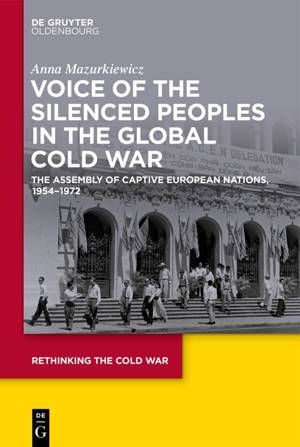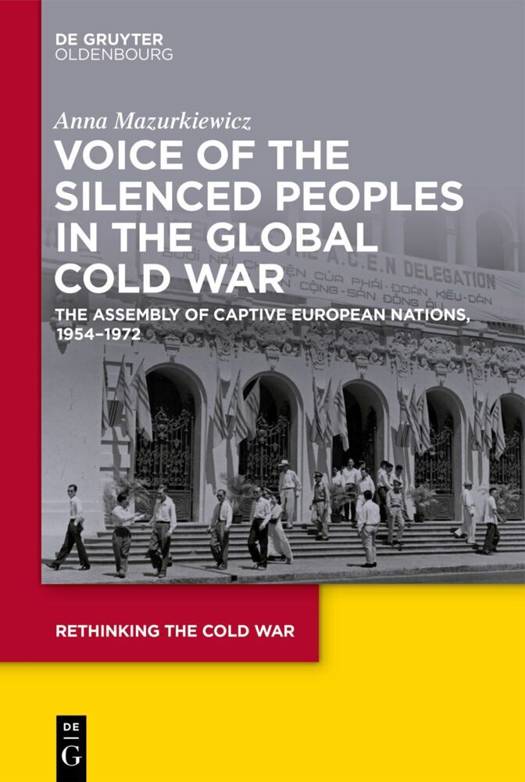
Door een staking bij bpost kan je online bestelling op dit moment iets langer onderweg zijn dan voorzien. Dringend iets nodig? Onze winkels ontvangen jou met open armen!
- Afhalen na 1 uur in een winkel met voorraad
- Gratis thuislevering in België vanaf € 30
- Ruim aanbod met 7 miljoen producten
Door een staking bij bpost kan je online bestelling op dit moment iets langer onderweg zijn dan voorzien. Dringend iets nodig? Onze winkels ontvangen jou met open armen!
- Afhalen na 1 uur in een winkel met voorraad
- Gratis thuislevering in België vanaf € 30
- Ruim aanbod met 7 miljoen producten
Zoeken
Voice of the Silenced Peoples in the Global Cold War
The Assembly of Captive European Nations, 1954-1972
Anna Mazurkiewicz
€ 113,45
+ 226 punten
Omschrijving
According to its members, exiled political leaders from nine east European countries, the ACEN was an umbrella organization--a quasi-East European parliament in exile--composed of formerly prominent statesmen who strove to maintain the case of liberation of Eastern Europe from the Soviet yoke on the agenda of international relations.
Founded by the Free Europe Committee, from 1954 to 1971 the ACEN tried to lobby for Eastern European interests on the U.S. political scene, in the United Nations and the Council of Europe. Furthermore, its activities can be traced to Latin America, Asia and the Middle East. However, since it was founded and sponsored by the Free Europe Committee (most commonly recognized as the sponsor of the Radio Free Europe), the ACEN operations were obviously influenced and monitored by the Americans (CIA, Department of State).
This book argues that despite the émigré leadership's self-restraint in expressing criticism of the U.S. foreign policy, the ACEN was vulnerable to, and eventually fell victim of, the changes in the American Cold War policies. Notwithstanding the termination of Free Europe's support, ACEN members reconstituted their operations in 1972 and continued their actions until 1989. Based on a through archival research (twenty different archives in the U.S. and Europe, interviews, published documents, memoirs, press) this book is a first complete story of an organization that is quite often mentioned in publications related to the operations of the Free Europe Committee but hardly ever thoroughly studied.
Founded by the Free Europe Committee, from 1954 to 1971 the ACEN tried to lobby for Eastern European interests on the U.S. political scene, in the United Nations and the Council of Europe. Furthermore, its activities can be traced to Latin America, Asia and the Middle East. However, since it was founded and sponsored by the Free Europe Committee (most commonly recognized as the sponsor of the Radio Free Europe), the ACEN operations were obviously influenced and monitored by the Americans (CIA, Department of State).
This book argues that despite the émigré leadership's self-restraint in expressing criticism of the U.S. foreign policy, the ACEN was vulnerable to, and eventually fell victim of, the changes in the American Cold War policies. Notwithstanding the termination of Free Europe's support, ACEN members reconstituted their operations in 1972 and continued their actions until 1989. Based on a through archival research (twenty different archives in the U.S. and Europe, interviews, published documents, memoirs, press) this book is a first complete story of an organization that is quite often mentioned in publications related to the operations of the Free Europe Committee but hardly ever thoroughly studied.
Specificaties
Betrokkenen
- Auteur(s):
- Uitgeverij:
Inhoud
- Aantal bladzijden:
- 463
- Taal:
- Engels
- Reeks:
- Reeksnummer:
- nr. 8
Eigenschappen
- Productcode (EAN):
- 9783110657050
- Verschijningsdatum:
- 16/12/2020
- Uitvoering:
- Hardcover
- Formaat:
- Genaaid
- Afmetingen:
- 155 mm x 231 mm
- Gewicht:
- 748 g

Alleen bij Standaard Boekhandel
+ 226 punten op je klantenkaart van Standaard Boekhandel
Beoordelingen
We publiceren alleen reviews die voldoen aan de voorwaarden voor reviews. Bekijk onze voorwaarden voor reviews.











